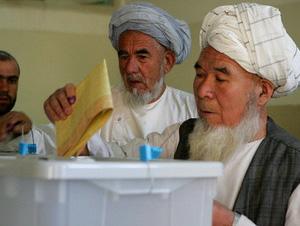Former UN official on Afghan election fraud
Voters in Afghanistan. (Image: iec.org.af)
The following is a partial transcript; for full story, listen to audio.
Peter Galbraith was the number two official with the UN mission in Afghanistan until last week, when he was dismissed from his position because of differences over how to deal with fraud in the Afghan election. The dispute has been publicly aired over the past five days.
In a recent interview with “The World’s” Marco Werman, Galbraith explained how election fraud in Afghanistan is hurting the efforts of the US and its allies there.
“Well, the problem with the fraud in the Afghanistan elections is that it makes any other part of the international strategy very difficult to execute,” said Galbraith. “The troop surge that is currently being discussed involves protecting the population and then transitioning to a situation where the Afghan government starts to provide development, essential services, police and army, and that’s very hard to do if you don’t have a credible Afghan government; and that is hard in the circumstances where there’s been an election that’s been characterized by such massive fraud.”
Galbraith believes that in order to make progress Afghanistan, the international community will have to first deal with the issue.
“NATO and its allies will be in Afghanistan for a very long time unless there’s a credible Afghan partner, and that in turn requires a credible government that is seen as legitimate, both by the people who supported the winning candidate, and by the people who did not.
“This election was intended to be a milestone on Afghanistan’s path toward democracy and stability. Instead, it has produced a prolonged political crisis, a great deal of uncertainty. It’s been the period since the election has represented the biggest strategic gain for the Taliban in eight years of war. So the political environment has made the military situation much worse for the 100,000 troops.”
The UN says it has no mandate to interfere with the election. Galbraith thinks the claim is “absurd.”
“The Security Council in fact has said that the UN should support the Afghan institutions in the holding of free, fair and transparent elections, not fraudulent elections,” said Galbraith. “And to have sat on the sidelines, to have tried to downplay the fraud — as the head of the UN mission did — has contributed to a crisis that has made it much worse for the United States, Canada and our other allies.”
With what he calls a lack of a “credible Afghan partner,” Galbraith thinks putting more troops into the country isn’t going to accomplish counter insurgency goals.
When asked if he feels his remarks would erode public support of US efforts in Afghanistan, Galbraith says he understands the concern, but asserts that election fraud, and the “failure” of the UN and international community to do something about it, is derailing the mission in Afghanistan.
“When I’m home in Vermont, people would ask me, ‘Why are we in Afghanistan?’ And prior to these events, I could provide an explanation that begins with the events of 9/11.
“Now the question that people put to me is: ‘Why are we in Afghanistan? Why are we supporting a regime that is blatantly stealing an election?’ And it’s very hard to answer that question.”
PRI’s “The World” is a one-hour, weekday radio news magazine offering a mix of news, features, interviews, and music from around the globe. “The World” is a co-production of the BBC World Service, PRI and WGBH Boston.
